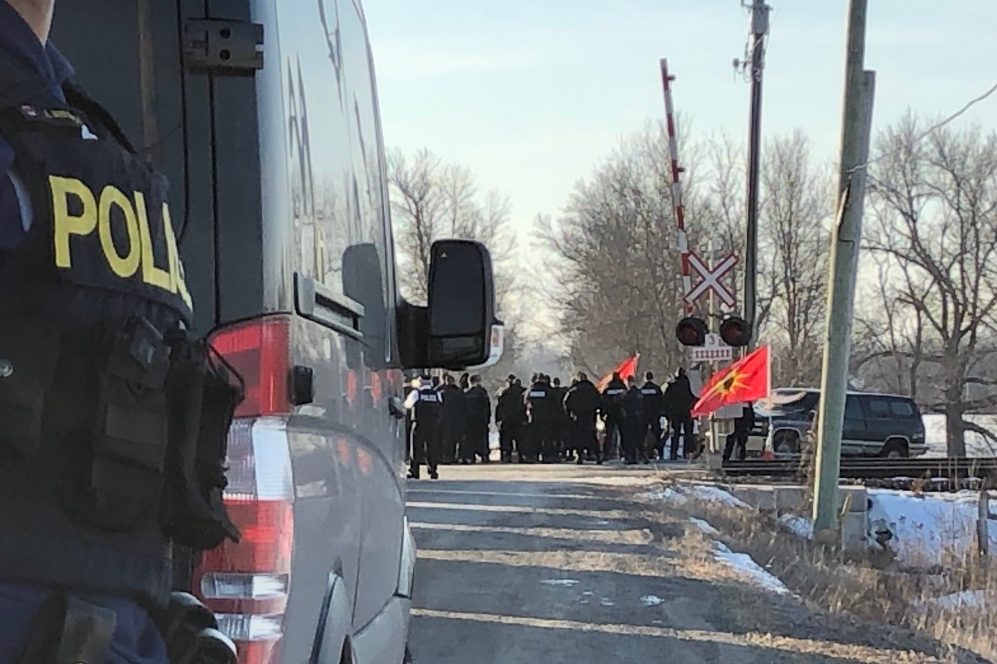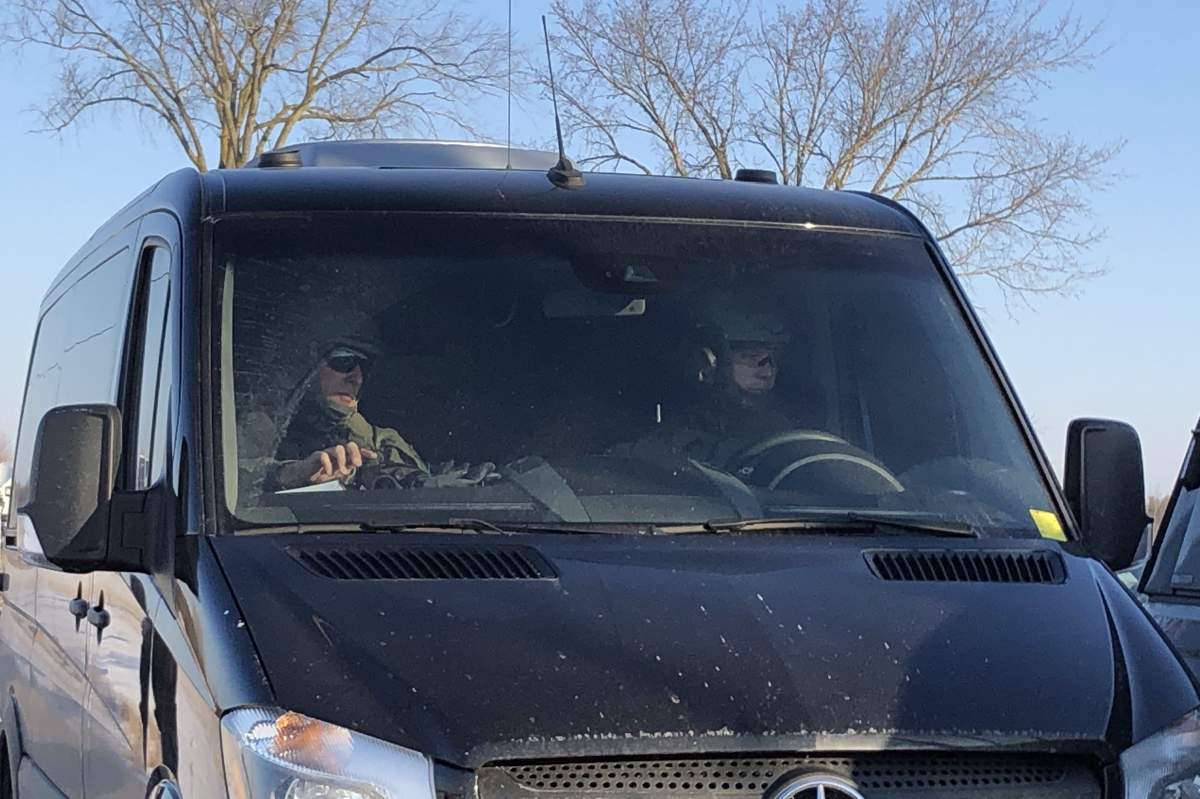Ontario Provincial Police arrested “several” people Monday at a railway blockade in Tyendinaga, which was set up nearly three weeks ago in solidarity with anti-pipeline protests in northern British Columbia.

The police action came hours after a midnight deadline calling for the protesters to clear the area expired. OPP has not said whether anyone faces charges, or given a specific number of arrests, but acknowledged that the situation is “ongoing.”
Despite the day’s events, the lines of communication between the government and Wet’suwet’en hereditary chiefs remain open, federal Indigenous Services Minister Marc Miller said.
“It means now that we’re working even harder… We remain committed to a peaceful resolution,” he told reporters before Question Period Monday. “We’re not only fighting days of suspicion and mistrust but decades and centuries.”
All five hereditary chiefs were expected to meet in northern B.C. Monday to plan their next steps. It’s believed talks with the RCMP could resume on Thursday, at the earliest.
Miller said he hopes the results of that meeting are positive.

The blockade near Belleville, Ont. was established on Feb. 6 in a show of support for the hereditary chiefs of the Wet’suwet’en Nation, who oppose the construction of a massive natural gas pipeline on their territory in B.C.
Three blockades have also sprang up in British Columbia: one on a rail line near New Hazelton, one on a rail line in Maple Ridge targeting the West Coast Express commuter train and another blocking the Port of Vancouver. A Wet’suwet’en solidarity protest also erupted in Victoria, B.C..
Monday evening also saw protesters establishing a new rail blockade in Hamilton, Ont. — just hours after the blockade on Mohawk territory was dismantled.
A post on the Wet’suwet’en Strong: Hamilton in Solidarity Facebook group said the blockade began at 5 p.m. ET “in response to the OPP raid on Tyendinaga.”
Further protests also unfolded in Mohawk communities in Quebec Monday — all in response to the police action in Ontario. Protesters in solidarity with Wet’suwet’en obstructed roads and blockaded railways in the Kanesatake and Kahnawake communities.
The Wet’suwet’en hereditary chiefs say the pipeline cannot proceed without their consent, despite the fact Coastal GasLink has received support from a number of other elected band councils along the 670-kilometre pipeline.
Protesters on the Ontario blockade were given until just before 12 a.m. ET to leave the tracks. The blockade, which has choked railway traffic across a significant swath of Ontario and Quebec, was still in place in the early hours of Monday morning.
Sources in the Mohawk community told Global News protesters had no intention of leaving, and that they were prepared for police arrival.
A stream of OPP vehicles descended on the site shortly after 8 a.m. Monday. A number of protesters were led away by officers, some in handcuffs.
OPP said in a statement that enforcement of the court-ordered injunction “may include the arrest of those who choose not to comply.”

Get daily National news
“Use of force remains a last resort,” the provincial force said, adding that no one was injured.
“The OPP will continue to follow and engage in communication while enforcing the injunction. Open communication, a reasoned and tempered approach, and proper use of police discretion guides the OPP’s response to this and other major events.”
While the situation was tense, both sides appeared to engage in a discussion for some time, though it’s unclear what about.
Many of those arrested were placed in a police van. They could be heard banging on the walls and singing songs in unison from inside.
At another demonstration nearby, protesters set fire to tires, causing thick plumes of black smoke to drift high into the sky.
In a live stream posted on Facebook by local Indigenous media outlet Real Peoples Media, reportedly taken about 15 minutes after OPP arrived, dozens of officers stand face-to-face with protesters.
“Look at all these guns against us. How many years? How many years have you had these guns against us?” one protester asks police in the video. The officers do not respond.
“This is Mohawk territory you’re on. You guys are trespassing.”

The move to dismantle the Ontario blockade comes after Prime Minister Justin Trudeau demanded injunctions be enforced Friday.
“Every attempt at dialogue has been made but discussions have not been productive. We cannot have dialogue when only one party is coming to the table,” he said during a press conference Friday. “The fact remains: the barricades must now come down. The injunctions must be obeyed and the law must be upheld.”
He convened his cabinet’s incident-response group on the matter shortly after police moved in on Monday morning. The group discussed solutions to the blockades, ways to restore rail service across Canada and the ongoing economic impacts of the demonstrations.
The government says it is committed to finding a “peaceful and lasting resolution” that respectfully ends the blockades while also upholding the “rule of law.”
Opposition Leader Andrew Scheer accused Trudeau of “doing nothing” to quell the dispute.
Scheer said he believes supporting reconciliation involves upholding the rule of law. He pointed to the more than 20 First Nations communities along the pipeline route that have signed their support for the project.
“If we want to be serious about First Nations, we have to listen to them when they say yes, and we can’t give certain people veto of these types of projects,” he said before Question Period.
“They cannot break the law. They cannot cause other people to lose their jobs and suffer economic hardship because they don’t like a decision being made.”

As police began the work to dismantle the barricade, more protesters flocked to Parliament Hill to show their support for the Wet’suwet’en hereditary chiefs.
The group of youth climate activists initially planned to protest against Teck Resources’ Frontier oilsands project, but following the news that broke overnight that the company has pulled back their application for the project, the activists switched their focus to the Wet’suwet’en First Nation. Hundreds of protesters took to Ottawa’s downtown streets, many of them chanting slogans like “U-G-L-Y, CGL, you cheat and lie,” referring to the company at the heart of the natural gas pipeline, Coastal GasLink.
In a statement early Monday morning, the Mohawk community in Tyendinaga said they had no intention of leaving until three “pending issues” are seen to:
- the RCMP leaves the Wet’suwet’en territory in B.C.
- a follow-up meeting is had with Indigenous Services Minister Marc Miller
- a concern for the safety of families “if any use of force” by police were to occur
“There has always and continues to be, a willingness from the Tyendinaga Mohawks to discuss an exit strategy of the CN Rail Main Line,” the statement reads.
“We are currently waiting on confirmation from the Wet’suwet’en Hereditary Chiefs that the RCMP have left Wet’suwet’en territory, as they have just arrived home from visiting our lands.”
OPP on site of a blockade set up on a rail line in eastern Ontario in solidarity with the hereditary chiefs of Wetsuweten Nation on Feb. 24, 2020.
The chiefs visited supporters this week in Tyendinaga and Kahnawake, just south of Montreal, where they told crowds that their conditions for talks to resume had not been met.
According to RCMP, a mobile unit on the Wet’suwet’en territory in B.C. has been temporarily closed. The spokesperson told Global News on Saturday that discussions were underway with the RCMP deputy commissioner about its future in the area.
–With files from The Canadian Press and Global News’ David Lao, Nick Westoll and Simon Little









Comments
Want to discuss? Please read our Commenting Policy first.